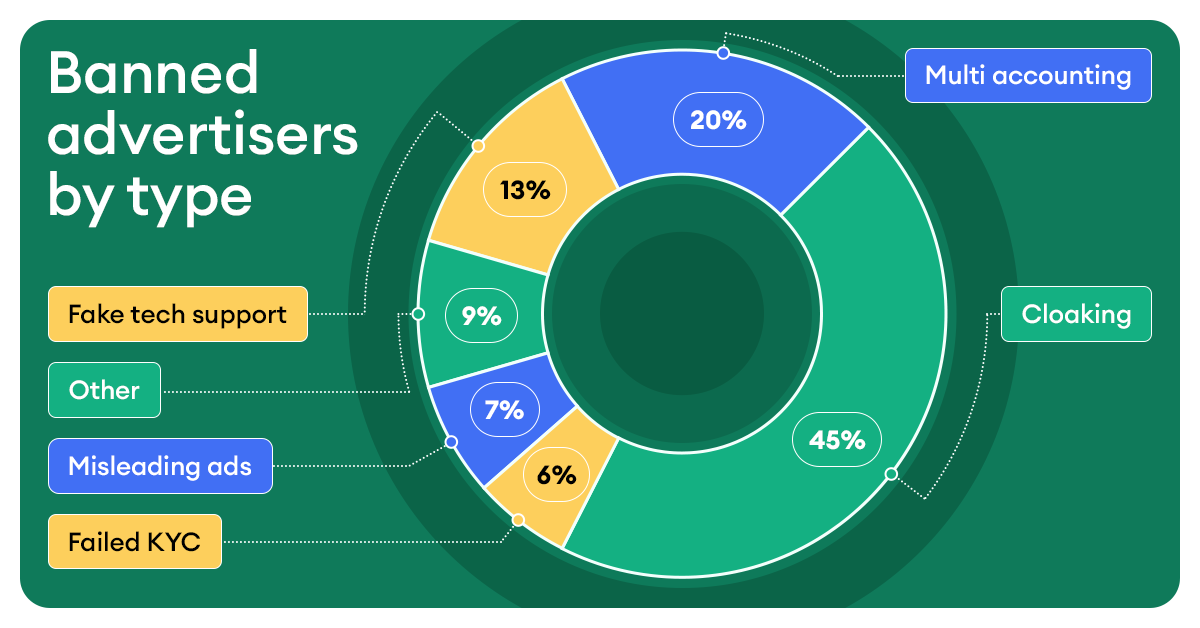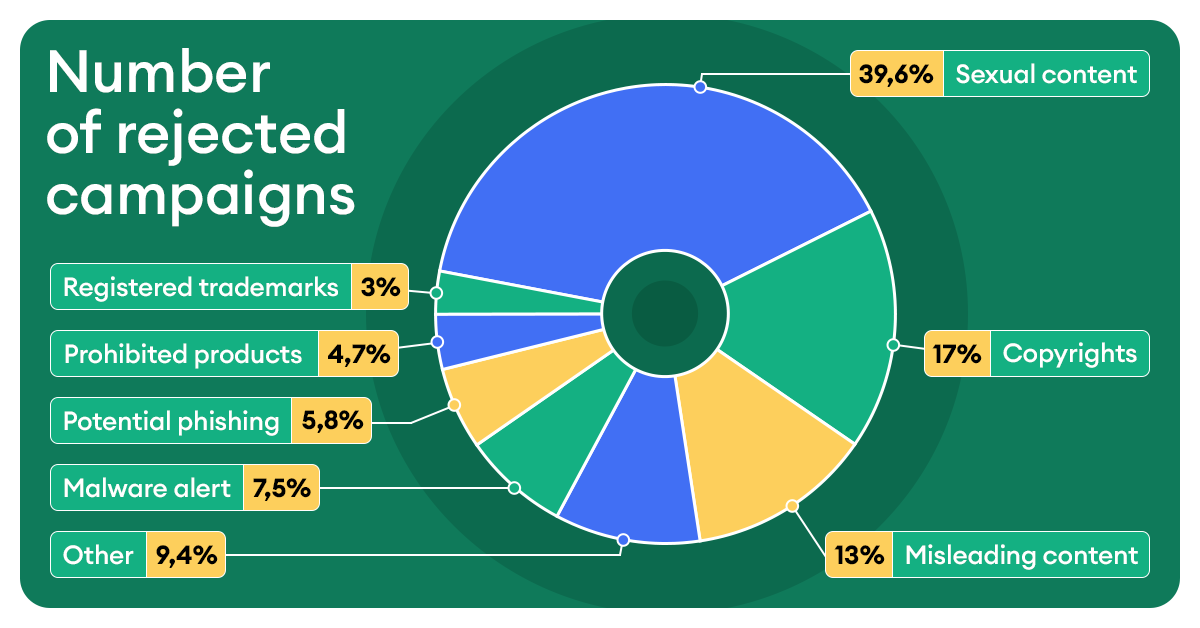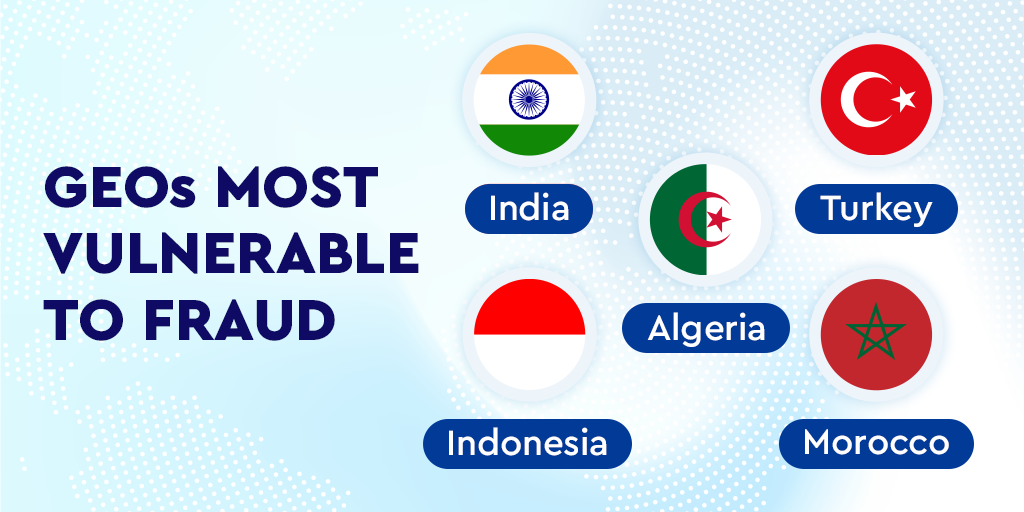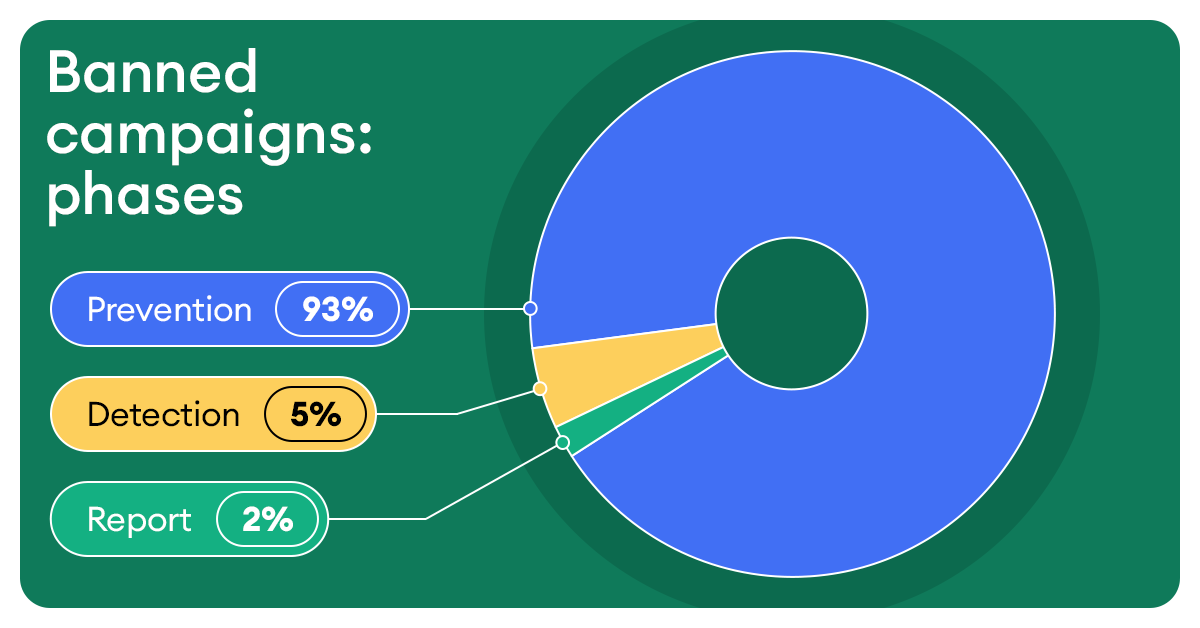No Mercy for Fraud: Banned Ad Campaigns 2022 [Infographics]

Ad fraud is an almost ancient phenomenon – the digital industry has been chasing fraudsters since the global Internet appeared. Malware, phishing, scam offers, and numerous manipulations with URLs and landing pages are just to name a few types of ad fraud.
As Statista claims, the 2021 cost of digital ad fraud worldwide was estimated at 65 billion U.S. dollars. That is approximately half of what is spent on digital advertising in the United States annually, or the entire annual revenue of the Walt Disney Company.
Unfortunately, fraud is everywhere: there are hundreds of fraud schemes, thousands of cheaters.
And we at PropellerAds do our best to decrease these numbers by moderating ad campaigns carefully. How exactly? Find out from this article.
So, our Policy team shared some interesting insights right from the fields, where they deal with all kinds of malware and other threats 24/7. They have gathered fraud statistics for the entire 2022 – our report contains detailed information about banned campaigns, reasons for ban, GEOs most affected by fraud, and more. Are you ready to dive into reflective research and see how we deal with those who violate rules?
Banned advertisers stats by reason
According to ADEX statistics, the most widespread type of fraud is cloaking: malware, copyright infringement, and push subscription offers (prohibited by our policies). The number of detected and rejected campaigns with illegal types of cloaking (techniques that also include hiding malware distribution) made up 45% of all that were banned in 2022. This diagram shows the whole picture:

Let’s get into more details and explain some of the most widespread types of campaigns we have banned:
- Cloaking. Basically, there are different types of cloaking, but we focus on a technique that masks the destination of an affiliate link by creating a custom URL to hide malicious or prohibited content, malware, spyware, phishing and fraud, etc. This way, one version of the website is shown to search engine crawlers and the other, an illegitimate one, – to visitors.
- Multi accounting. In the case of PropellerAds, multi accounting is an attempt of an advertiser to create a new account after his previous one was banned for fraud. We don’t allow such advertisers to create new accounts.
Rejected campaigns: number and types
And here are rejected campaigns, namely, those we didn’t ban entirely, but had to reject because of the policy violation:

Sexual content is the leader here. We do have tough policies about adult content, but in 2022 39.6% campaigns of that kind were trying to sneak through (no success).
17% in the category of copyrights – mostly, those who tried using existing brands’ logos, so they didn’t pass moderation. And then we can see misleading ads – 13%, including those that claim that “your computer is infected” or “viruses found, etc.
These are the most widespread types of cheating, but we also had malware alerts (7,5%), potential phishing (5,8%), prohibited products (4,7%), and registered trademarks (3%).
Rejected campaigns have a second chance. Our Policy usually explains the reason for rejection, and advertisers have a chance to remove prohibited content and then send a campaign for moderation again.
GEOs
According to the internal statistics of ADEX, our partner and advanced anti-fraud system to track and prevent fraud in real time, countries most vulnerable to fraud are:

Protection and moderation 24/7
Our Policy team detects 93%+ of potentially harmful/illegal campaigns at the very first stage – prevention. We believe that the best way to deal with issues is rather prevention than fixing consequences.

We have detailed terms and conditions, which actually shape our fraud-fighting strategies. Some interesting facts:
- Our Policy team pays exceptional attention to the advertising feed purity, legibility of the software, products promoted, and the whole chain of redirects.
- The ad campaigns are moderated 7 days a week, 24 hours a day.
- It takes our Policy team about 3 minutes to moderate one campaign.
- Each campaign is moderated multiple times during its whole lifetime, which means that if an advertiser decides to violate the rules after the moderation was passed, our Policy will catch him anyway.
- Each campaign is being checked under the same targeting settings (GEO, browser, device type) as those included into the campaign itself.
- The Policy team has in-house instruments to check campaigns.
- Suspicious campaigns and advertisers are additionally carefully evaluated by our senior Policy team members.
- The policy rules are re-evaluated and updated continuously to make sure they are in line with any legal changes or industry standard.
So, you’ve had a slight sneak into the everyday life of our Policy. Yes, as you can see, these guys are real superheroes who work day and night to check campaigns and catch fraudsters. Continue reading our blog and find out more exciting stuff!
Fighting advertising fraud isn’t easy and requires a group effort. If you are aware of someone using or attempting to use our network fraudulently, or in violation of our policies, please inform us immediately at contact.us @ propellerads.com.
And welcome to our Telegram Chat, where you can ask questions and share your feedback!


